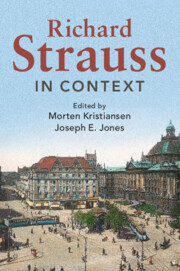Book contents
- Richard Strauss in Context
- Composers in Context
- Richard Strauss in Context
- Copyright page
- Contents
- Figures
- Notes on Contributors
- Preface
- Note on Translation
- Part I Family, Friends, and Collaborators
- Chapter 1 Family and Upbringing
- Chapter 2 Formative Influences
- Chapter 3 Pauline de Ahna
- Chapter 4 Close Friends
- Chapter 5 Hofmannsthal
- Chapter 6 The Other Librettists
- Chapter 7 Stage Collaborators
- Chapter 8 Champions
- Part II Career Stations
- Part III Cultural Engagement and Musical Life
- Part IV Professional and Musical Contexts
- Part V In History
- Part VI Artifacts and Legacy
- Further Reading
- Appendix: Letters Bibliography
- Index
Chapter 5 - Hofmannsthal
from Part I - Family, Friends, and Collaborators
Published online by Cambridge University Press: 08 October 2020
- Richard Strauss in Context
- Composers in Context
- Richard Strauss in Context
- Copyright page
- Contents
- Figures
- Notes on Contributors
- Preface
- Note on Translation
- Part I Family, Friends, and Collaborators
- Chapter 1 Family and Upbringing
- Chapter 2 Formative Influences
- Chapter 3 Pauline de Ahna
- Chapter 4 Close Friends
- Chapter 5 Hofmannsthal
- Chapter 6 The Other Librettists
- Chapter 7 Stage Collaborators
- Chapter 8 Champions
- Part II Career Stations
- Part III Cultural Engagement and Musical Life
- Part IV Professional and Musical Contexts
- Part V In History
- Part VI Artifacts and Legacy
- Further Reading
- Appendix: Letters Bibliography
- Index
Summary
The chapter presents a survey of the life and works of Richard Strauss's foremost librettist, the Austrian poet, playwright, and essayist Hugo von Hofmannsthal whose fame as a poetic genius began in his teenage years. His early poetry and poetic dramas established his reputation as the poet of aestheticism – an image he tried to shed all his life. A person of extraordinary sensitivity and erudition, he was drawn to Greek dramas, mythology, as well as folk and fairy tales which he tried to recreate for a modern audience. They offered him a framework for expressing social and ethical questions in a subtle, seemingly un-didactic fashion. In literary history, he is primarily noticed for his language skepticism (above all, his Letter of Lord Chandos); for the general public, his collaboration with Strauss is certainly the highpoint of his career (the operas Der Rosenkavalier and Elektra leading the list).
- Type
- Chapter
- Information
- Richard Strauss in Context , pp. 39 - 49Publisher: Cambridge University PressPrint publication year: 2020

